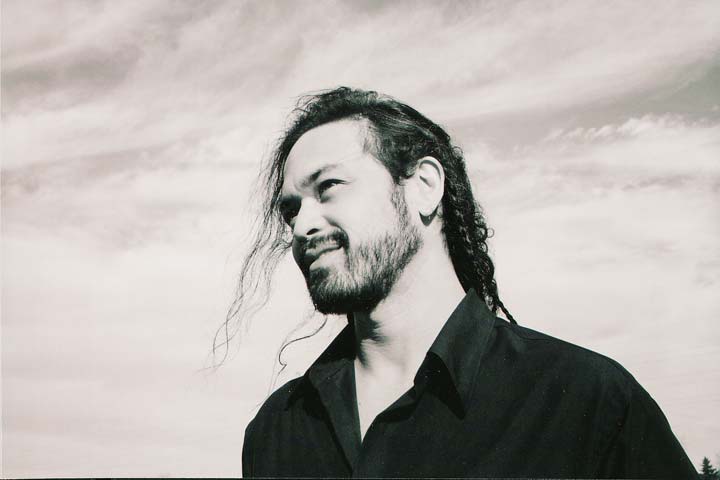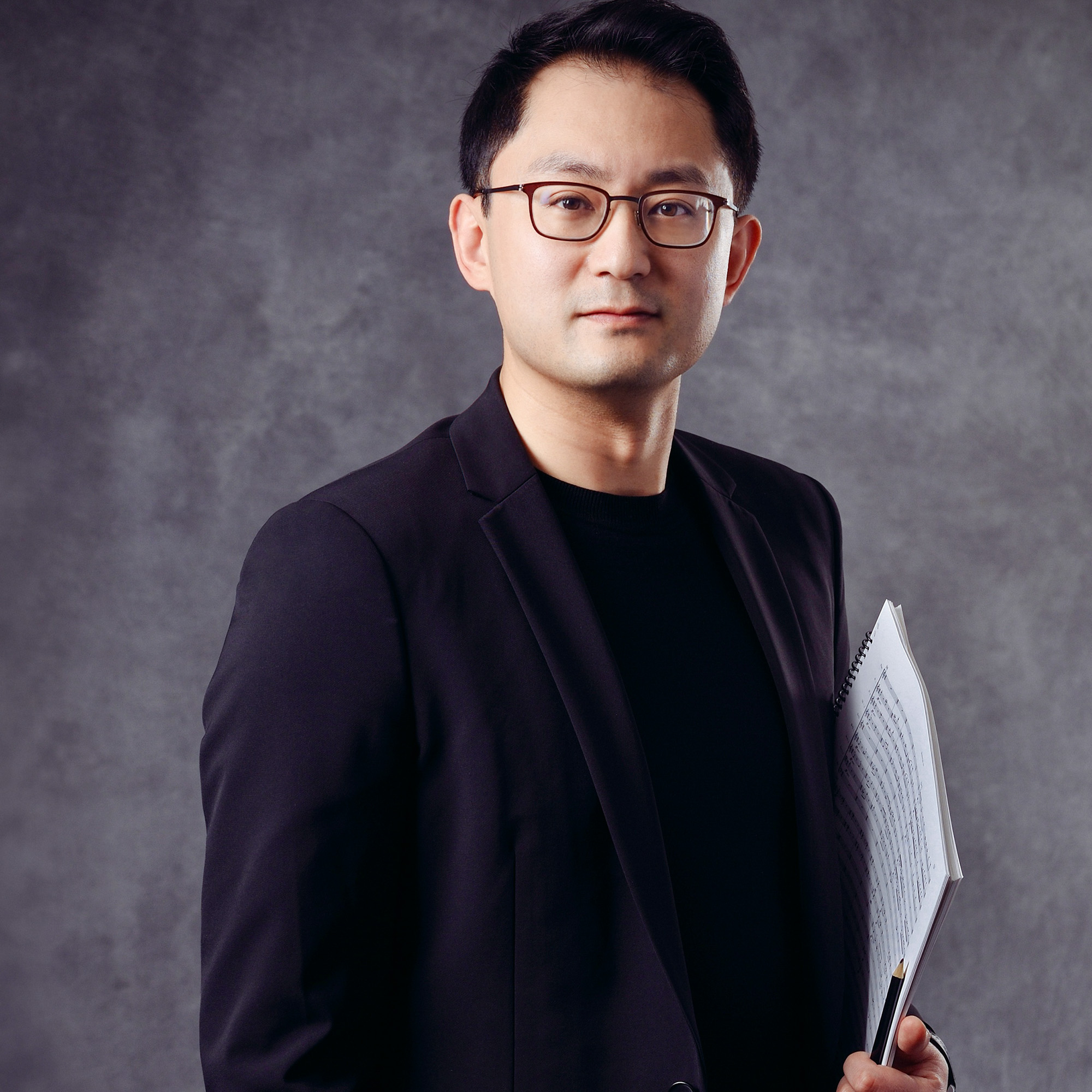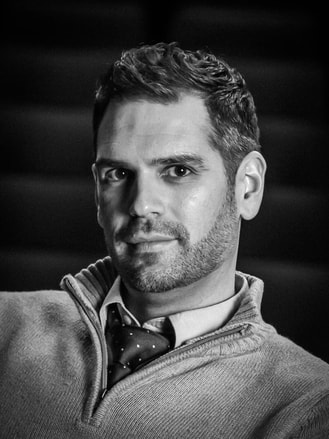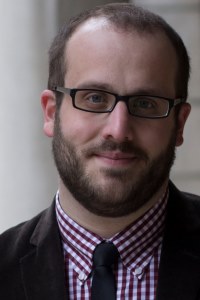
Erik Santos (b. 1967)is a composer, multi-instrumentalist, singer, producer, and teacher, who is active in many musical genres, from rock and jazz, to classical, to electronic, world music, and music for theater and dance. He is the Chair of the Composition Department at the University of Michigan School of Music, Theatre & Dance.
As the first-born in a family of musicians – father Rosendo Ejercito Santos, Jr., mother Harriet, brothers Nathan and Jason – music has always been at the core of his life practice, both as a profession and hobby.
Santos has received many commissions, prizes, fellowships, and other recognitions for his concert music, including the Charles Ives Scholarship and the Charles Ives Fellowship from The American Academy of Arts and Letters, awards from Broadcast Music Incorporated (BMI), the MacDowell Colony, the Bozeman Symphony, the Civic Orchestra of Chicago, the Rackham Graduate School of U-M, and the Music Teachers National Association (MTNA). In addition to more traditional concert music, Santos is interested in presenting music in venues other than the classical concert hall where there is more emphasis given to the interaction of music with other spontaneous sensory elements.
His Sousa-ABA-Ostwald winning piece, The Seer, a work for wind ensemble with solo vocalist, weaves together disparate artistic influences like Rainer Maria Rilke, Nina Simone, Stanley Kubrick, and the mythical Ulysses with the poetry of Langston Hughes.

The music of Canadian-British composer Peter Meechan (b. 1980, Nuneaton, UK) is extensively performed throughout the world. His music has been commissioned, recorded, broadcast and performed by some of the world’s leading symphony orchestras, wind ensembles, brass bands, conductors and soloists, including: “The President’s Own” United States Marine Band, The United States Air Force Band, The United States Army Band “Pershing’s Own”, Dallas Symphony Orchestra, BBC Concert Orchestra, Edmonton Symphony Orchestra, Chicago Symphony Orchestra brass, The Dallas WindsBlack Dyke Brass Band, The Band of the Coldstream Guards, RNCM Wind Orchestra, Bramwell Tovey, Jens Lindemann, Ryan Anthony, David Childs, Steven Mead, Patrick Sheridan, Les Neish, Peter Moore, Linda Merrick, and many more.
Peter was the first ever “Young Composer in Association” with the prestigious Black Dyke Brass band from 2003 – 2006, where he also went on to serve as their “Composer in Residence” for a further season. Meechan also held the position of “Composer in Residence” with The Band of the Coldstream Guards between 2012 – 2015.
He holds an undergraduate degree (BMus Hons) from the Royal Northern College of Music (Manchester, UK), where he studied with Dr. Anthony Gilbert, Dr. David Horne and Adam Gorb, a Master of Arts (MA) degree and a PhD (composition), both from the University of Salford (Manchester, UK), where he studied with Prof. Peter Graham.
Between composing two works with darker subject matter, Meechan wrote Perpetua about the world that he wants to live in, a world that is more joyful, hopeful, energetic, exciting, and fun.

Grammy-nominated Chinese-American composer Zhou Tian (b. 1981) seeks inspiration from different cultures and strives to mix them seamlessly into a musically satisfying combination for performers and audience alike.
His music — described as “absolutely beautiful…utterly satisfying” (Fanfare), “stunning” (the Cincinnati Enquirer), and “a prime example of 21st-century global multiculturalism” — has been performed by leading orchestras and performers in the United States and abroad, such as Jaap Van Zweden, Yuja Wang, Manfred Honeck, Long Yu, the New York Philharmonic, London Philharmonic, San Francisco Symphony, Pittsburgh Symphony, Mahler Chamber Orchestra, Melbourne Symphony, “The President’s Own” US Marine Band, Dover Quartet, and Shanghai Symphony, where he recently served as the Artist-in-Residence. His Concerto for Orchestra, commissioned and recorded by the Cincinnati Symphony and Louis Langrée, earned him a GRAMMY Award nomination for Best Contemporary Classical Composition in 2018, making him the first Chinese-born composer and the second Asian composer (following Tōru Takemitsu) honored in that category. In 2019, Beijing Music Festival named him “Artist of the Year.” In 2022, he became the first Asian-American composer to win the Sousa-ABA-Ostwald Award.
Born into a musical family in 1981 in Hangzhou, China, Zhou moved to the US when he was 19. Trained at the Curtis Institute (B.M.), the Juilliard School (M.M.), and the University of Southern California (D.M.A.), he studied with some of America’s finest composers, such as Jennifer Higdon and Christopher Rouse. He is associate professor of composition at Michigan State University.
Sinfonia was jointly commissioned by a CBDNA consortium. Sinfonia seeks inspirations from different cultures and mixes them into four different movements. It begins nostalgically and ends on a hopeful, uplifting note.
I. Noir
Grainy films and stylized black-and-white images from the 1940s and ’50s inspired this nostalgic throwback. Although it starts brightly, at its core lies the night.
II. Transit
New York City. Subway. Rush hour. Each stop opens to a new soundscape. “Say, did I hear Jazz?” Someone asks. “STAND CLEAR OF THE CLOSING DOORS, PLEASE,” New York replies.
III. Arioso
Shanghai. Night of the Mid-Autumn Festival. A vocalise was conceived.
IV. D-O-N-E
May 10, 1869. Promontory, Utah. A one-word telegraph was sent across the United States in Morse code, announcing the completion of the First Transcontinental Railroad. Now the country was connected as never before: a journey between San Francisco and New York that previously took up to six months now took only days. Some 150 years later, that word, “D-O-N-E,” is transformed here into music using the rhythm of the Morse code. Throughout the finale, the “done” motif is passed back and forth by numerous instruments in the orchestra. An accumulation of materials sends the piece to a climax at the end. This movement was adapted from a movement of the composer's orchestral work Transcend.

Andrew David Perkins (b. 1978) is a composer, conductor, multi-instrumentalist, & GRAMMY® nominated music educator. He holds an advanced specialist certificate in orchestration from the Berklee College of Music, a Master of Music degree from the University of Michigan, and a Bachelor of Fine Arts degree from Michigan State University. Finalist for The National Band Association Revelli Award, Merrill Jones Award, and The Ravel International Composition Prize, his music has been featured at ABA Conventions, CBNDA National and Regional Conferences, TMEA, The Midwest Clinic, The Western International Band Clinic, and at numerous all-state concerts and state conferences. Mr. Perkins is the winner of the 2018 National Band Association/Alfred Publishing Young Band Composition Contest, and his concert band suite TUEBOR was selected as the winner of the 2023 American Bandmasters Association Sousa-ABA-Ostwald Composition Contest.
TUEBOR SUITE is a three movement suite that honors the rich agricultural, maritime, and lumbering history of Perkins’ home state of Michigan. Using archival recordings taken by ethnomusicologist Alan Lomax and the performances of 1950s folk musician Duane Starcher, Perkins tells the story of the workers and industries that made Michigan in the nineteenth and twentieth centuries.

David Biedenbender (b. 1984) is a composer, conductor, and performer. He has written music for a wide range of venues from the concert hall and the dance floor, and he seeks out collaborations with all types of musicians and artists. His background as a euphonium, bass trombone, and tuba player has allowed him to draw from a wide range of influences including rock, jazz, brass bands, and Indian Carnatic Music. Recent commissions and collaborations include those from Alarm Will Sound, the PRISM Saxophone Quartet, the Stenhammar String Quartet, The New Jersey Symphony Orchestra, the Aspen Music Festival Contemporary Ensemble, the Albany Symphony Orchestra, the Music from Copland House Ensemble, and the U.S. Navy Band.
Biedenbender teaches at the College of Music at Michigan State University where he is able to mentor a younger generation of composition students. He received his doctorate from the University of Michigan. He cites Michael Daugherty, Evan Chambers, Bright Sheng, Kristin Kuster, Stephen Rush, Christopher Lees, David R. Gillingham, José Luis-Maurtúa, John Williamson, and Mark Cox.
River of Time was first commissioned by and written for trumpeter Neil Mueller and performed by the Lansing Symphony Orchestra. Biedenbender soon after arranged the piece for wind ensemble. Drawing from the writings of Carlo Rovelli and Marcus Aurelius, River of Time is an expression of how Biedenbender understands the musical and philosophical ideas that encompass all that is time.
